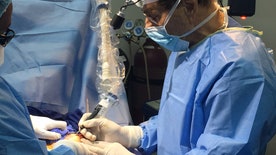 Like so many breast cancer patients, Melissa Rabe was devastated when she was diagnosed with triple negative breast cancer in January 2015. She had already lost her sister to the disease 25 years ago.
Like so many breast cancer patients, Melissa Rabe was devastated when she was diagnosed with triple negative breast cancer in January 2015. She had already lost her sister to the disease 25 years ago.
“Since this is in my family history, I was discouraged,” Rabe, who lives in New York City, told FoxNews.com. “But I also felt that I had to find a better way to combat this diagnosis.”
Treatments for women vary from case to case, but Dr. Vincent Ansanelli, a breast cancer surgeon at Laser Breast Cancer Surgery in Long Island, New York, offered an option Rabe was unfamiliar with— laser treatment in breast cancer surgery.
Instead of using a scalpel to cut and remove a cancer tumor, doctors use a carbon dioxide laser. When the intense beam of light touches tissue— breast or otherwise— it causes the tissue to vaporize.
“I’m dissecting by means of vaporization,” Ansanell told FoxNews.com.
Ansanelli, who pioneered the laser technique, said it has benefits over traditional scalpel surgery
"I’m vaporizing the tissue in order to make my incision like a knife would, but [at the same time] it’s sealing little lymphatics and blood vessels so there's little to no bleeding and little to no spreading if any," Ansanelli said.
Rabe had a highly aggressive diagnosis and feared traditional surgery could potentially cause her cancer to spread. According to the National Cancer Institute at the National Institutes of Health, the chance of cancerous cells spreading to other parts of the body via scalpel is extremely low.
Not wanting to take the risk, Rabe scheduled laser surgery with Ansanelli in May 2015.
During the procedure, the laser also sanitizes the area in order to reduce the potential spread of cancerous cells.
“The laser isn’t just dissecting, it’s destroying tumor cells,” Ansanelli said.
In animal studies, the local recurrence rate following tumor resection done with a carbon dioxide laser was about 30 percent less than normal, he added.
However, not all doctors are convinced by the procedure’s effectiveness.
“Usually you would want to see some studies that show human-based benefits,” Dr. Beth Anglin, the medical director of The Breast Center with Sarah Cannon Cancer Institute at The Medical Center of Plano in Plano, Texas, told FoxNews.com. “I would think [universities and cancer centers] would be using it as well—they have used newer technologies like other radio frequency modalities and Cryoablation— but I haven’t heard anything at all about laser treatments.”
In contrast to scalpel surgery, the laser procedure requires only local anesthesia and doesn’t require hospitalization or post-operative medication.
After Ansanelli performed a mastectomy on Nikki Rash, 51 a stage 4 breast cancer patient from Lakeland, Florida, she was ready to go home within the hour.
"I feel pretty good, obviously I’m a little sore there, but, I feel good," Rash told FoxNews.com, speaking immediately after the procedure.
Ansanelli usually recommends an extra strength Tylenol for patients who feel any discomfort or fatigue after surgery.
“There are some patients that do require anesthesia, but other than that it does sound very interesting,” Dr. Laura Kruper, chief of breast surgery service at City of Hope in Duarte, California, told FoxNews.com. “As long as we have more data, it could be something that we should all try to offer I’m curious and want to learn more.”
In 2016, almost 300,000 women will be diagnosed with breast cancer, according to BreastCancer.org.
"When I received my diagnosis, I made a promise to my parents that they would not bury two daughters in their lifetime," Rabe said.
After removal, Ansanelli sends the tumors to a lab for complete analysis to determine if further treatment is needed. Typically, some form of systemic therapy like radiation or chemotherapy is recommended.
“This tool has been around for decades and it should be a choice,” Rabe said. “When you have treatment choices you feel empowered, and you feel strong and ready, willing and able to address this diagnosis.”
Today, Rabe is in complete remission.
The carbon dioxide laser method was approved by the Food and Drug Administration (FDA) and has been used to treat head and neck, tongue and vocal cord cancer. Insurance does cover some of the costs of surgery.
Fox News